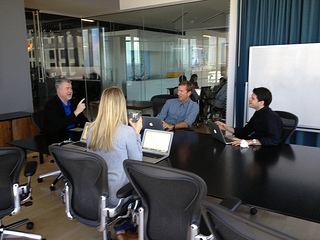3 Things to Consider Before Moving Your ERP to the Cloud

Cloud ERPs (enterprise-resource-planning) are taking the manufacturing world by storm (pun intended). But is the hype hotter than the strategy itself, and will it work for your business? Emergent technology is marketed as the best new solution; what really counts is the reliability and usability of the solution your company ends up with when the excitement subsides.
Before you move your supply chain to a Cloud ERP software, consider the following aspects of this management platform.
This article is for Premium Members only. Please login below to read the rest of this article.
Not a Premium Member yet? Become one today.
[login_form redirect=’https://www.procurementbulletin.com/3-things-to-consider-before-moving-your-erp-to-the-cloud’]
[show_to accesslevel=’Premium Members’]
What is Cloud ERP?

A Cloud ERP is a SaaS (software-as-a-solution) model product that’s accessible via the internet. Enterprise Resource Planning, a term common to manufacturers and supply chain managers goes high-tech as top executives are able to control important aspects of inventory management, finance, and more through a web-enabled device.
Cloud ERPs offer a solution for not only interpreting significant data sets, but uploading and storing them as well. To get started, here are three things you need to know:
1. All Cloud ERPs Aren’t Created Equally
There’s a huge emphasis on Cloud ERP mobility for manufactures. In a Forbes report by contributor Louis Columbus he states, “ERP systems mobile platforms are most often used for material handling, warehouse management, traceability, quality management, logistics and service tracking. From the discussions I’ve had with CIOs and a few CEOs of manufacturing companies, there’s a high level of interest in analytics, alerts and approvals on Android and Apple tablets.”
The problem is not all Cloud ERPs offer access via a specific mobile app. Sure, some Cloud ERP providers claim mobility, but all-around access from any web-enabled device via a mobile browser doesn’t always equal the best experience. Consider how you’ll use your Cloud ERP platform. If you envision access on the ground level, then a company that offers a mobile app is the way to go – all others need not apply.
2. It’s Customizable

Many Cloud ERPs are completely customizable, but know that it comes with a cost. Typically, Cloud ERPs are subscription-based services, so the more your company adds in terms of deployment options, the more the subscription fee.
Cloud ERP service provider Acumatica invests in providing a flexible platform that suits the real complicated needs of the individual manufacturing enterprise and not the industry as a whole. Acumatica allows you to select multiple base suites ranging from customer management to distribution management, and even accounting. However, the price increases with each customization. Companies that offer a baseline service are better for those looking to get their feet wet in Cloud ERP.
3. Big Companies Are Buying In
A tech trend isn’t a thing until big companies start buying in. In the case of Cloud ERP, Amazon has its back. According to PC World, via Amazon Web Services, the company will offer not only Cloud ERP, but, “series of product suites on the company’s IaaS (infrastructure as a service).”
Amazon’s investment in Cloud ERP is potentially big news for mobile access, as well as how sustainable the technology remains. As a company that deals heavily in fulfillment and supply chain management, Amazon has a vested interest in the future of this technology. If you’re interested in moving your ERP to the Cloud, then considering Amazon’s current and future strategy is a must.
Ultimately, supply chain managers should shop around for the best solution. As the technology continues to grow, so do the number of companies offering relevant Cloud ERPs, which presents an opportunity for manufacturers interested in streamlining their current processes.
Are you using a Cloud ERP strategy for your supply chain? If not, what’s keeping you from making the switch? Share your thoughts in the comments below. [/show_to]








